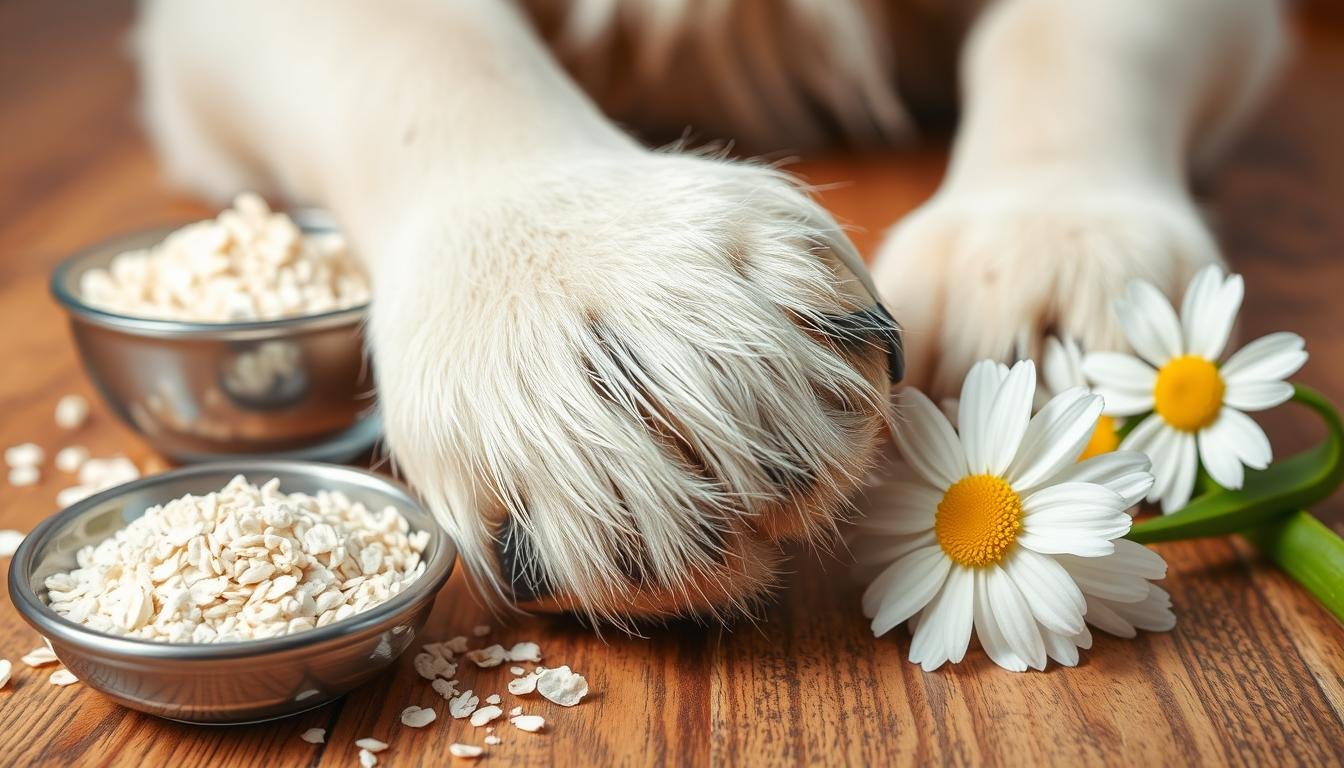Cinnamon is a favorite spice in many homes, but it raises questions for pet owners. Can dogs safely enjoy cinnamon’s warm scent and taste? Or is it a no-go for our furry friends? This guide helps pet owners understand the safety, benefits, and risks of cinnamon in a dog’s diet.
While cinnamon is not toxic in small amounts, knowing the risks and right dosage is key. With careful use, cinnamon can be good for our pets. Let’s explore if dogs can have cinnamon safely.
Understanding Cinnamon Safety for Dogs
It’s important to know about cinnamon safety for dogs. There are two main types: Cassia and Ceylon. Ceylon cinnamon is safer for dogs because it has less coumarin. Coumarin can harm the liver and kidneys in big amounts.
Different Types of Cinnamon
Cassia cinnamon is cheaper but has more coumarin. This makes it riskier for dogs. Ceylon cinnamon, being more expensive, is safer because it has less coumarin.
Safe vs. Unsafe Forms
The form of cinnamon matters too. Ground cinnamon is usually safe in small amounts. But cinnamon sticks can be a choking hazard. Cinnamon essential oils are too strong and should never be given to dogs.
Common Sources of Exposure
Dogs can get cinnamon from baked goods, spice racks, or supplements. Keep cinnamon out of reach to avoid accidents. Proper storage and watching your dog can keep them safe.
| Cinnamon Type | Coumarin Level | Safety for Dogs |
|---|---|---|
| Cassia Cinnamon | High | Unsafe in large quantities |
| Ceylon Cinnamon | Low | Generally safe when used in moderation |

Knowing about cinnamon types helps you decide safely for your dog. Always talk to your vet before adding cinnamon to your dog’s diet.
Health Benefits of Cinnamon for Dogs
Cinnamon is a spice that can help our dogs in many ways. It’s known for its anti-inflammatory properties, which can ease arthritis and joint pain. It also has antioxidants that boost brain health and protect against diseases.
Cinnamon may also help with heart health by controlling blood sugar in diabetic dogs. Its antibacterial properties add to its benefits. But, it’s important to talk to a vet before adding cinnamon to your dog’s diet.
- Cinnamon contains 6.4 calories, 2.1 grams of carbohydrates, 1.4 grams of fiber, and 0.1 grams of protein per teaspoon.
- Ceylon cinnamon is safer for dogs because it has less coumarin, a harmful compound.
- Cinnamaldehyde in cinnamon is key for its anti-fungal, anti-inflammatory, and heart health-promoting properties.
“A sprinkle of cinnamon might help dogs prone to high blood pressure or low blood sugar maintain a healthy balance.”
While cinnamon can be good for dogs, it’s important to use it carefully. Follow the recommended amount and watch for side effects, like in small breeds or dogs with health issues. Always check with your vet before adding cinnamon to your dog’s food.
Can Dogs Have Cinnamon: Dosage and Safety Guidelines
Cinnamon might have health benefits for dogs, but knowing the right amount is key. The safe amount depends on the dog’s size and health. It’s important to follow safety guidelines.
Recommended Serving Sizes
Most dogs can safely have less than one teaspoon of cinnamon powder. The exact amount depends on the dog’s weight. Smaller breeds need even less. Always check with a vet before giving cinnamon to your dog.
Signs of Cinnamon Overdose
- Vomiting
- Diarrhea
- Changes in heart rate
If your dog shows these signs after eating cinnamon, call your vet right away.
Risk Factors for Small Dogs
Small dogs might be more sensitive to cinnamon. They need even smaller amounts. Be very careful with small or toy breeds. They can easily have bad reactions.
Always talk to a vet before adding cinnamon or any new food to your dog’s diet. This ensures their safety and health.

Potential Risks and Side Effects
Cinnamon is usually safe for dogs in small amounts. But, eating too much can irritate their mouth and stomach. It can also cause coughing, choking, and breathing problems if they inhale it.
Cinnamon essential oils are even riskier. They can cause more serious reactions.
Cassia cinnamon has a lot of coumarin, which is bad for dogs. It can harm their liver if they eat too much. Eating too much cinnamon can also lower blood sugar and cause liver damage.
Dogs might have allergic reactions to cinnamon. This can show as sneezing, an itchy nose, or stomach problems like diarrhea and vomiting. Cinnamon toxicity can result in lowered blood sugar and liver damage in dogs.
Safer Alternatives
For dog owners wanting to add good spices to their pet’s diet, turmeric is a good choice. Turmeric has anti-inflammatory properties. It’s safer for dogs, including those with diabetes, because it helps control blood sugar.
| Cinnamon Consumption Guidelines for Dogs |
|---|
| Tiny Dogs: Approximately a quarter teaspoon of cinnamon per day |
| Small to Medium Dogs: Around half a teaspoon of cinnamon per day |
| Larger Dogs: Between half to two teaspoons of cinnamon per day |
Always talk to a vet before adding cinnamon or any new food to your dog’s diet. This makes sure it’s safe for them.
“Cinnamon is generally safe for dogs in small quantities, but it’s important to monitor your pet’s reaction and consult your veterinarian before adding it to their diet.”

Cinnamon Essential Oils and Dogs
It’s important to be careful with essential oils, like cinnamon, around dogs. Cinnamon essential oil is very strong and can be harmful, even in small amounts. Dogs can get sick from breathing it in, eating it, or touching it.
Dangers of Essential Oil Exposure
Cinnamon essential oil can make dogs vomit, lower their blood sugar, and harm their liver. The main ingredient, cinnamaldehyde, can irritate a dog’s breathing. This can cause coughing, choking, and trouble breathing.
Eating cinnamon essential oil can also mess with a dog’s blood sugar and liver health.
Safe Alternatives
Instead of essential oils, use a little ground cinnamon or cinnamon treats made for dogs. These options can help freshen breath and support health without the risks of essential oils.
Always talk to your vet before adding new things, like cinnamon, to your dog’s diet or space. This way, you can enjoy cinnamon’s scent while keeping your dog safe and healthy.
| Essential Oil | Potential Risks for Dogs |
|---|---|
| Tea Tree Oil | Irritation, vomiting, depression, ataxia, paralysis, tremors |
| Wintergreen | GI irritation, vomiting, diarrhea, seizures, coma, liver/kidney failure |
| Pine Oil | Skin, mucous membrane, and GI tract irritation, central nervous system issues |
| Pennyroyal | Lethargy, vomiting, diarrhea, seizures, coma, liver problems, and death |
| Cinnamon | Vomiting, diarrhea, liver disease, low blood pressure, respiratory irritation |
| Lavender | Calming, soothing to the central nervous system when used properly |
While cinnamon can be good for dogs, use it carefully and avoid essential oils. They are too strong and can be very dangerous. Always check with your vet to make sure cinnamon is safe for your dog.
Baked Goods and Cinnamon Treats
While dogs can safely consume small amounts of baked goods, many treats contain harmful ingredients. These include xylitol, chocolate, raisins, and too much sugar or fat. It’s safer to give dogs special treats made just for them, with safe amounts of cinnamon.
Cinnamon is safe for dogs, but only the Ceylon variety has lower coumarin levels. Other spices like nutmeg can be very toxic. They can cause dry mouth, seizures, and stomach pain in dogs. Always check the ingredients of any treats you give your dog.
If you want to add cinnamon to your dog’s diet, talk to your vet first. They can tell you how much is safe. Small dogs can have less than 1/2 teaspoon, medium dogs up to 3/4 teaspoon, and large dogs up to 1 teaspoon.
Too much cinnamon can make dogs sick. They might vomit, cough, or have changes in their heart rate. In big doses, it can even harm their liver or cause low blood sugar. Always be careful with what you give your dog.
Remember, cinnamon essential oils are extremely toxic to dogs. They can cause serious health problems if dogs ingest them or get them on their skin. Always choose safer options and talk to your vet before adding anything new to your dog’s diet.
“The health and safety of our furry friends should always be the top priority when it comes to their diet and treats.”
Emergency Response: What to Do If Your Dog Eats Too Much Cinnamon
If your dog eats a lot of cinnamon, you need to act fast. Cinnamon is usually safe but can be dangerous in big amounts. Watching your dog and getting vet advice is key.
Immediate Actions to Take
- Remove any remaining cinnamon from your dog’s reach and provide access to fresh, clean water.
- Observe your dog closely for signs of distress, such as vomiting, diarrhea, or difficulty breathing.
- Contact your veterinarian immediately, even if your dog doesn’t show any immediate symptoms. Cinnamon toxicity can have delayed effects.
When to Contact Your Vet
Always be careful with your dog’s health. If your dog eats a lot of cinnamon or shows bad symptoms, call your vet. In serious cases, they might need emergency care.
Recent data shows the average pet insurance claim for dietary issues, like cinnamon, is $642 from January 2019 to April 2024. This highlights the need for vet help if you think your dog has eaten too much cinnamon.
Remember, your dog’s safety is the most important thing. Quick action and calling your vet can help your dog get the right care and recover from cinnamon problems.
Conclusion
Cinnamon can be safe for dogs if used carefully and with a vet’s advice. It has health benefits like reducing inflammation and improving heart health. But, it’s important to know the risks of too much or the wrong type of cinnamon.
While cinnamon isn’t toxic, too much can upset a dog’s stomach. It’s also key to choose Ceylon cinnamon over Cassia because it has less coumarin. Owners should also watch out for treats with harmful ingredients like xylitol or nutmeg.
Knowing how much, what type of cinnamon to use, and the risks helps dog owners make good choices. With a vet’s help and care for your dog’s health, cinnamon can be a great addition to their diet.
FAQ
Can dogs have cinnamon?
Dogs can have a little cinnamon without harm. It might even help them. But, too much or the wrong kind can upset their health.
What are the different types of cinnamon?
There are two main types: Cassia and Ceylon. Ceylon is safer for dogs because it has less coumarin. Different forms of cinnamon, like powder or sticks, have different safety levels.
How can dogs be exposed to cinnamon?
Dogs might get cinnamon from treats, spice racks, or when people give it to them. Knowing how they get cinnamon is key to keeping them safe.
What are the health benefits of cinnamon for dogs?
Cinnamon might help dogs with arthritis and joint pain. It could also improve their brain function and heart health. Plus, it might help control blood sugar.
What is the safe dosage of cinnamon for dogs?
The right amount of cinnamon for dogs depends on their size and health. Most dogs can safely have less than one teaspoon. Small dogs might need even less.
What are the potentially risks and side effects of cinnamon for dogs?
Too much cinnamon can irritate a dog’s mouth and stomach. It can also cause breathing problems if inhaled. Cassia cinnamon might harm the liver over time.
Are cinnamon essential oils safe for dogs?
No, cinnamon essential oils are too strong for dogs. Even a little can be toxic. It can cause vomiting, low blood sugar, and liver disease.
Can dogs eat cinnamon-containing baked goods and treats?
Dogs can have a bit of cinnamon, but treats with cinnamon often have bad stuff. Things like xylitol, chocolate, and too much sugar or fat are not good for dogs.
What should I do if my dog eats too much cinnamon?
If your dog eats too much cinnamon, watch them closely. Call your vet right away if they seem sick or if they’ve eaten cinnamon essential oils.



